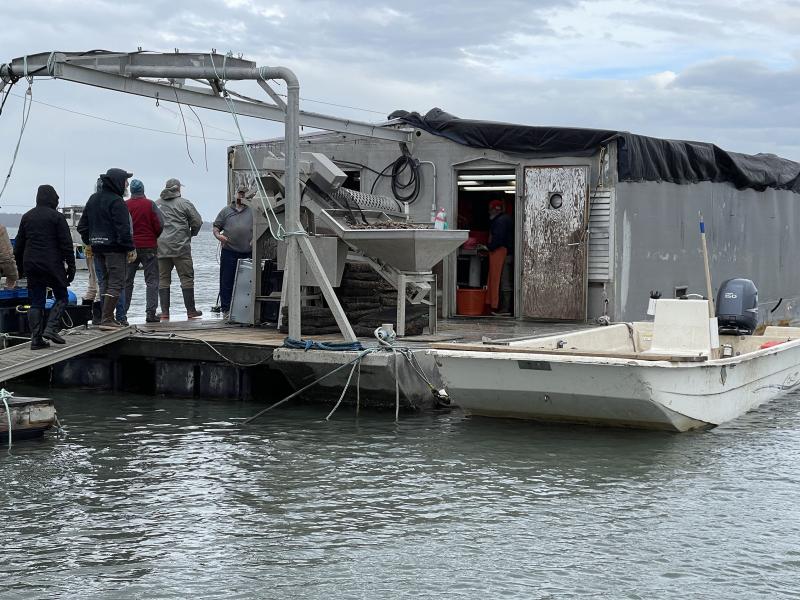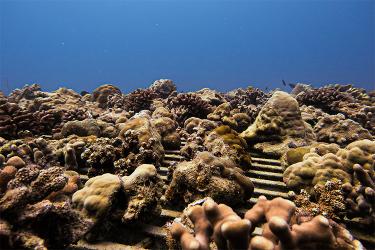The joint 25th Northeast Aquaculture Conference and Expo and 43rd Milford Aquaculture Seminar was held in Providence, Rhode Island, January 10-12, 2024. This year’s conference had its largest ever showing with 634 attendees and 236 presenters during 42 sessions over 3 days. In addition, 59 students received support to attend and present their work.
NOAA Engaging the Aquaculture Community
Keynote speaker Danielle Blacklock, the Director of the NOAA Office of Aquaculture, shared her personal experiences with seafood and stories of aquaculture businesses. She also talked about the importance of domestic aquaculture to the American economy and national food security. This was followed by industry updates from states from Maine to Virginia, as well as the Canadian Maritime provinces.
The Office of Aquaculture also held an interactive public listening session. Aquaculture growers, seafood industry workers, researchers, coastal community members, and the public shared their views on the future of aquaculture at NOAA Fisheries. This included which aspects of NOAA’s science and services are of most value to the public.
“Engaging with the public, fostering open and collaborative conversation, is critical as we chart the course for the future of aquaculture at NOAA Fisheries,” said Danielle Blacklock, director Office of Aquaculture. “The energy and ideas brought to this conference will help inspire and shape our vision moving forward.”
Information about upcoming listening sessions can be found on the Office of Aquaculture website.
Aquaculturists Unite
While the aquaculture community is growing, many have attended this meeting for years. “Information about what we do can be hard to come by, and this is the place to find it. Everyone is here—shellfish growers, NOAA Fisheries, Woods Hole Oceanographic Institution, and many more,” shared Thomas Henninger, owner of Madeleine Point Oyster Farms in Yarmouth, Maine, and former commercial fisherman. “It’s a chance to see people you don’t see very often—like my version of a school reunion, and it’s a blast. Everyone who I asked questions to when I was first starting to grow shellfish is here. How can you miss that?”
The conference is jointly organized by NOAA Fisheries Milford Laboratory, which conducts science to inform management for the sustainable expansion of aquaculture, and the Maine Aquaculture Innovation Center, an organization dedicated to developing socially, economically, and environmentally sustainable aquaculture opportunities in Maine. It was sponsored by 17 additional organizations, including:
- U.S. Department of Agriculture’s Northeast Regional Aquaculture Center
- Maine Technology Institute
- Sea Grant Northeast
The conference brings together:
- Aquaculture industry members
- Scientists
- Service providers
- Resource managers
- Vendors
- Students
Field Trips and Workshops
Before the conference officially kicked off, 189 participants got hands-on experience with aquaculture through field trips and workshops.
They toured some of the area’s preeminent aquaculture research and production facilities, including:
- American Mussel Harvesters’ shellfish processing facility
- Matunuck Oyster Farm
- University of Rhode Island’s marine research aquarium and aquaculture laboratory
A group ventured to southeastern Massachusetts and visited Blue Stream Shellfish, Ketcham Supply Co.’s manufacturing facility. Others toured the University of Massachusetts Dartmouth’s new seawater facility. Another group got a behind-the-scenes tour at the Mystic Aquarium.
Workshops focused on:
- Learning to cook with locally sourced, farmed seafood with chefs at Johnson & Wales University
- Connecting Northeast aquaculture extension professionals and expanding regional collaboration
- Learning the fundamentals of seaweed farming
- Sharing strategies to expand oyster aquaculture opportunities for a diverse workforce
- Applying genomics to oyster conservation, management, and aquaculture
Trade Show
Aquaculture vendors demonstrate their innovative new products and services and connect with shellfish growers and researchers at the trade show. This year 34 exhibitors participated, including:
“Connecting with people is what it’s all about as a vendor. I’m also a shellfish farmer, which is helpful because farmers want to talk to someone with firsthand experience using the gear,” explained Keith Butterfield, Northeast Distributor for FlipFarm USA. “Cool crossover conversations happen when I talk with a farmer who uses our system, and other farmers start listening to that farmer’s experiences. There’s immense value in getting together as a business sector. It can be solitary when you’re out on the farm. You learn so many pearls of wisdom from other farmers.” He also runs Butterfield Shellfish in Yarmouth, Maine.
“We always look forward to catching up with people across different disciplines at this meeting. It’s the perfect blend of industry, academic and government folks,” explained Heather Ketcham of Ketcham Supply Co.
Diversity, Equity and Inclusion Listening Session
The conference hosted its first women and minorities in aquaculture networking event in 2022. This year the organizers built on that commitment with a listening session during which participants shared their personal stories and lived experiences.
“We can be the reason that someone feels seen, heard, and valued,” said Anne Langston Noll of Maine Aquaculture Innovation Center.
“It was wonderful to see the conference creating space to discuss diversity, equity, and inclusion, and to see so many people participate in the conversation,” said Jon Hare, Director of the Northeast Fisheries Science Center, who co-led the session with Isaiah Mayo of NOAA Fisheries and Langston Noll.
Interactive Sessions and Sustainability
Many sessions featured interactive components, including those focused on aquaculture education and building social license to farm. In an education workshop hosted by the University of Maine Cooperative Extension and Center for Cooperative Aquaculture Research, participants constructed their own mini-aquaponics systems. They also took a virtual tour of an aquaculture research lab using virtual reality goggles. They left with hands-on curricula to teach youth about aquaculture.
Several sessions also focused on innovative ways to promote sustainability in aquaculture. Those included sessions devoted to harnessing solar power, reducing plastic use in aquaculture gear, and the growing partnership between the shellfish aquaculture and restoration communities.
"This conference was born in 1998 out of a need to connect aquaculturists in the Northeast with researchers, government officials, nonprofits, and industry vendors in an informal, fun and experiential environment,” said Chris Davis, executive director of Maine Aquaculture Innovation Center and co-founder of the meeting. “It's rewarding to see growing interest in this biennial gathering.”
The Northeast Aquaculture Conference and Expo first joined up with the Milford Aquaculture Seminar in 2012. The next Milford Aquaculture Seminar will be held in Shelton, Connecticut, in January 2025, and the next joint conference will be held in January 2026.






